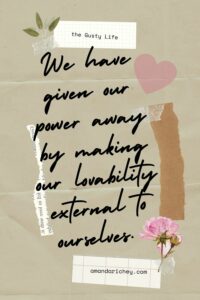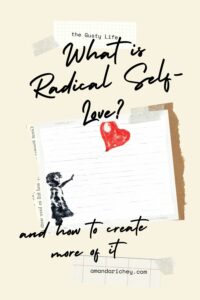
What is radical self-love? I have been asking myself that for the last year. It has taken me that long to write this post. I have been struggling for the better part of a year with a sense of self. With how to love myself really. What I have come to realize is that I never really knew how to love myself unconditionally. Now, after a year of some serious soul searching and hard work I think I am starting to understand how to love myself, and that has been radical.
What is Radical Self-Love?
Radical self-love is about abundance, boundaries, and having your own back and what I learned was that I had no idea what that meant.
I had been living my life up until this point by basing my worth on my actions and accomplishments. This worked great for a while. I had an easy way to keep up the accomplishments; school, college, graduate school, an academic career. All of those things were very happy to give me accolades for my actions, my doing, my accomplishments.
And I loved it. I ate it up!
It became all about the best grades and the best research and the best scholarships and awards. The funny thing is, as I progressed farther into the world of academia (from college to grad school to career) the accolades became fewer and farther between and much harder to get. I began to fail; to not get the best grades, to not get all the scholarships or research opportunities, and I began to realize how dependent I had become on all of that ‘easy’ action-oriented self-worth.
Then I began to channel it into my personal life: get everything done on the to-do list, have the perfect house and yard, have the perfect pregnancy and birth, raise the perfect kid, check all of the boxes and then someone will pat me on the shoulder and tell me I am worthy, right?
You may laugh, but the truth is many of us fall into this quest for worth in our doing, and we can go on for years before we realize we have tied up our self-worth and lovability in other people’s opinions of us.
We have given our power away by making our lovability external to ourselves.
And if you’re anything like me, you may not realize this is what you’ve done until you cannot physically DO anymore. Then you realize you never really loved yourself, but what other people thought of your accomplishments.
My Ah Ha Moment
For me it wasn’t a single instant that brought this to my attention, it was a slow unwinding and remaking of my life that has been a continual growth journey for the last six years. It started with the sudden death of my mother while I was still in graduate school. As any devastating event, this had a profound effect on the way I perceived the world. I began to see how pointless the accomplishments were compared to the moments. I stopped really caring about school and how well I did, and just focused on finishing. Once that hurdle was over, I began to focus more on things that felt important to me and growing those areas of my life, but I was still very action oriented. I planned trips and started businesses and set goals.
Then I had my daughter, and I again gained a bit more insight; time is so fleeting, what are your real priorities? I realized I needed to stop pleasing others and do what I needed for me, and so I quit my job to be home with my daughter and create a life I wanted; one with flexibility, contribution, and presence.
But still, I was action oriented. I tied my worth and lovability to being a present mom, to creating a new career from home, to doing. Then I got pregnant with my second and the pandemic began. I became severely depressed. I couldn’t move sometimes from the weight of it, and suddenly my doing was nonexistent. I couldn’t fake it anymore and I realized how much I hated myself.
It finally appeared that all of the little insights and lessons I had gained throughout the past six years were all adding onto each other one by one: all you have is this moment, you better make it count; time is fleeting, you will never have this time again; are you really living the life you want? Do you have the guts to change it? Do you love yourself enough to change it?
What I realized was that I didn’t know how to love myself, to love my being. To love unconditionally, because I had always been loving conditionally, based on my actions and outward approvals. When anyone would ask me what my best qualities were or what I loved about myself it was always a list of accomplishments, never characteristics. I was all about doing and suddenly I couldn’t do anymore.
I have written elsewhere about my summer of radical self-love, but in sum, it was an attempt to find myself and ‘cure’ my depression through more doing, and as you would expect it didn’t work. But, I learned the most valuable lesson thus far; what radical self-love really is and how to practice it. Because it is a practice. Every. Damn. Day. It is work – hard work – but it has made all the difference.
What is Radical Self-Love?
Radical Self-Love is Having an Abundance Mindset
An abundance mindset comes from a place of trust, acceptance, and a deep sense of inner worth and security. An abundant mindset takes a proactive approach to life. It is believing you are worthy no matter what, instead of attaching your worth to a circumstance or a person’s behavior, which stems from scarcity. A scarcity mindset is one of fear, insecurity, and control. Of taking things too seriously, believing that if you fail, the world will end. It is short sided and focused on short term decisions, instant gratification, and a reactive approach to life, rather than planning ahead and trusting.
How to Have an Abundance Self-Love Mindset
Having an abundance mindset is knowing that you are 100% loveable, and that nothing anyone else does will change that. Love is a feeling created in your mind. You create your lovability. You are the exact person you are meant to be, and you can love yourself no matter what.
How do you love yourself with an abundance mindset? Unconditionally. You don’t love yourself based on outcomes or actions or the reactions of others, you love yourself based on trust and compassion for yourself. Take a step back and remember that even when you make a mistake or say something you wish you hadn’t, or don’t do or say something you wish you had, you are still worthy. Unconditional love is the understanding that you are worthy because of your imperfections.
Take One Step:
Create an affirmation that feels believable to you about your worth. Say your affirmation out loud, or in your head, or write it down anytime a thought of self-doubt comes to you. Pick one. And use it as your mantra. This will begin to re-wire your brain.
For example:
I am worthy no matter what
I create my worth, no one else does
My worth is in my being not in my doing
I am the exact person I am meant to be
I am 100% loveable
I create my lovability
Radical Self-Love is Having Your Own Back
Having your own back means practicing self-compassion. It is a continual practice of not placing value on the emotions you experience, but letting them be, feeling them, and letting them go. It is remembering that we all feel emotions, and we all experience vulnerability with those emotions. They are part of the human experience. To have your own back is to connect with ourselves and others with empathy and love. To do this we must practice opening up and letting ourselves be seen and loved for our imperfections, not in spite of them.
How to Have Your Own Back
Practice self-compassion. Talk to yourself like you would your best friend. For example, would you say “You are such an idiot! Why did you do that?” Or would you say, “Hey, it’s okay, you made a mistake.” Having your own back is choosing not to engage in shaming, blaming, or guilting yourself. It is giving yourself permission to be who you are, to take care of your needs, to fail, and to love yourself anyway.
Practice empathy with yourself. We all struggle, we all screw up, we all suffer, feel pain, loss, guilt, shame, joy. No matter how alone you feel in your emotions, others have felt it too. You are not alone.
Take One Step:
Give yourself permission. Whenever you feel you have failed, you feel you ‘should’, you feel less than worthy, give yourself permission. Permission to rest. Permission to fail. Permission to make mistakes. Permission to love yourself.
Radical Self-Love is Having Boundaries of Steel
Radical self-love is having and holding boundaries. What are boundaries? They’re as simple and as complicated as knowing what is okay and what is not okay for yourself, acting on it, and sticking to it. Honor the commitments and boundaries you set for yourself.
How to Have Boundaries of Steel
Healthy boundaries help us end the cycle of self-abandonment because we begin to respect ourselves enough to honor our needs, desires, and values. This will help you build trust in yourself. Setting clear boundaries sends a message to yourself and others that you have a strong sense of self-awareness and self-respect.
Stay out of other people’s messes. When you let someone’s words or actions dictate your feelings, you are giving up your power and not holding a boundary with yourself. Don’t let their actions mean anything about you. What other people do has nothing to do with you. When you love yourself, you are confident and abundant because you trust and know that only you control your feelings (abundance mindset). The boundary: only I control my feelings, I will not let another cross into my feelings and control them and I cannot manage or control others’ feelings either.
Take One Step:
Begin to build back trust with yourself. Make a commitment to yourself. One small thing. Seriously, small, so that you can do it and make it a habit. Deep breaths every day before you start your work; a moment of quiet before your morning coffee; listing three things you are grateful for before bed… Whatever it is, make that commitment to you, for you, and then stick with it, for you. This will restore your trust in yourself and help you to begin to set boundaries with others.

Conclusion
Radical self-love is about unconditional love for oneself. Loving yourself because of your flaws, not in spite of them. It’s about an abundance mindset. It’s knowing, believing, and acting on the knowledge that you are worthy of love. It’s holding boundaries with yourself and others so that you can be in your own integrity while remaining compassionate towards those around you. It’s about having your own back, supporting and loving yourself no matter what, and having the guts to speak up for yourself and what you need.
It is a practice, which means you will always be evolving and struggling to love yourself the way you deserve to be loved. It is about living your truest life without apologies or explanations. It takes guts to practice radical self-love but when we love ourselves, the whole world benefits.




I love how you deconstruct complex concepts into simple and understandable parts.
Thank you, I am glad it resonated with you!
Thank you very much for sharing, I learned a lot from your article. Very cool. Thanks. nimabi
Your point of view caught my eye and was very interesting. Thanks. I have a question for you. https://accounts.binance.com/pl/register-person?ref=V2H9AFPY